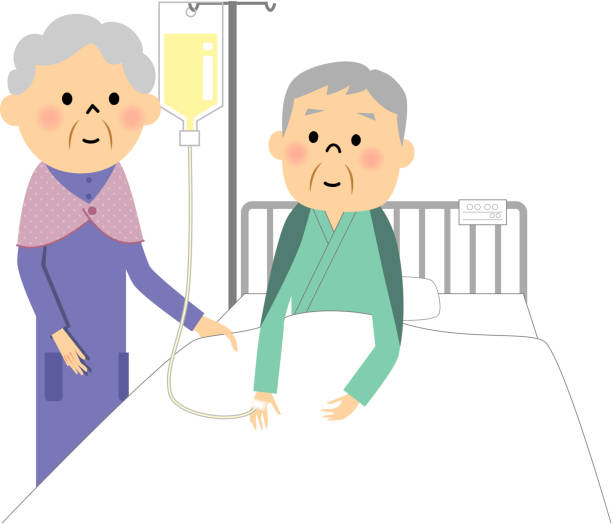Alternative Treatments
Can Seniors Get An IV Vitamin Drip
People’s bodies naturally change as they age, making it more difficult to maintain good health. Many seniors seek out numerous vitamins and treatments to help them feel their best, including IV vitamin drips. These intravenous infusions provide large amounts of vitamins and minerals directly into the bloodstream, bypassing the digestive system and providing rapid and effective nutrition. While IV vitamin drip may be useful for seniors, there are several things to bear in mind.
Before attempting an IV vitamin drip, contact with a healthcare provider as is the case with any other medical treatment. Seniors may have underlying health concerns or medications that interact with the vitamins and minerals in the drip, so seek professional counsel before beginning. Furthermore, healthcare providers may need to adjust the drip accordingly as seniors may require fewer doses of some vitamins compared to younger individuals. Overall, administering IV vitamin drips with caution and attention can provide seniors with a safe and successful way to improve their health and wellness.

Understanding IV Vitamin Therapy
IV vitamin therapy, also known as intravenous therapy, is a treatment in which vitamins, minerals, and other nutrients are delivered directly into the bloodstream via an IV drip. This kind of treatment is gaining popularity among seniors seeking to improve their health and well-being.
Basics of IV Therapy
IV therapy is a medical procedure that includes inserting a tiny needle into a vein in the arm. The needle is attached to an intravenous bag containing vitamins, minerals, and other essential elements. The solution is then gradually dripped into the bloodstream over time.
Benefits of IV Vitamin Drips
IV vitamin therapy can give seniors with a variety of benefits, including increased hydration, energy, and immunological function. It can also help with the symptoms of several medical illnesses, including as chronic fatigue, fibromyalgia, and depression.
Potential Risks and Side Effects
While IV vitamin therapy is mostly regarded as safe, there are some potential hazards and side effects to be aware of. Infection, allergic reactions, and vein irritation are all possible outcomes. Before undergoing IV therapy, consult with a healthcare expert to ensure that it is a safe and acceptable treatment option.
In conclusion, IV vitamin therapy can be an effective therapeutic choice for seniors who want to improve their general health and well-being. However, it is critical to understand the fundamentals of IV therapy, as well as the potential benefits and hazards, and to consult with a healthcare practitioner prior to beginning treatment.

IV Vitamin Therapy for Seniors
As people age, their nutritional requirements alter. Seniors frequently have difficulties acquiring all of the nutrients they require from their food alone. IV vitamin therapy is a common alternative for seniors who want to enhance their diet and improve their health.
Age-Related Nutritional Needs
As people age, their bodies become less capable of absorbing nutrients from diet. This can cause vitamin and mineral shortages, which are necessary for healthy health. Seniors may also struggle to chew or swallow, making it difficult to eat a well-balanced diet.
IV vitamin therapy can help seniors obtain the nutrients they require without relying exclusively on their food. IV treatment guarantees that elders receive the full benefit of vitamins and minerals by administering them directly into their bloodstreams.
Hydration and Immune Support
Seniors are more likely to become dehydrated, which can cause a range of health issues. IV treatment helps keep elders hydrated and boost their immune systems.
IV therapy can also enhance the immune system, enabling elders to stay healthy and prevent disease. IV treatment, which delivers high quantities of vitamins and minerals directly into the bloodstream, can help elders battle infections and other ailments.
Considerations for Senior Health
While IV vitamin therapy may be useful to seniors, there are several things to bear in mind. Seniors should contact a healthcare specialist before beginning IV therapy, as the treatment may impact their underlying health concerns.
Seniors should also exercise caution while using supplements, as some may interfere with prescriptions or produce unpleasant effects. Only a skilled healthcare expert should provide IV treatment to ensure that elders receive the correct dose of nutrients.
Overall, IV vitamin therapy is a safe and successful technique for seniors to supplement their diet and improve their health. IV treatment, which delivers critical nutrients directly into the bloodstream, can help seniors remain healthy and active as they age.

Safety and Efficacy
IV vitamin drips have gained popularity among people of all ages, including seniors. However, there have been concerns expressed concerning the safety and efficacy of this therapeutic option for the elderly. In this section of the article, we will look at the available clinical studies and evidence on the safety and efficacy of IV vitamin drips for seniors.
Clinical Research and Evidence
There is little scientific information about the safety and usefulness of IV vitamin infusions for elders. Researchers have predominantly focused on younger individuals, with few studies exclusively targeting seniors. However, some research suggests that IV vitamin drips may be beneficial for seniors suffering from specific health issues, such as malabsorption syndromes and chronic fatigue syndrome.
Monitoring and Preventing Complications
IV vitamin drips should only be given by qualified healthcare personnel in a hospital or facility setting. Seniors contemplating this treatment option should consult with their doctor about their medical history and medications before proceeding. It is also critical to watch for signs of infection or bad reactions during and after treatment.
In conclusion, while IV vitamin drips may provide some potential benefits for seniors with specific health issues, there is little empirical data supporting their safety and efficacy. Before proceeding with this treatment option, seniors should consult with their healthcare physician and carefully weigh the potential risks and advantages.

Practical Considerations
Cost and Accessibility
One of the most important practical factors for seniors thinking about receiving an IV vitamin drip is the cost. Although health insurance typically does not cover the cost of an IV drip, providers and locations may vary in their pricing. This means that seniors will have to pay for their therapy out of pocket.
In addition to cost, accessibility is an essential factor. While certain hospitals may provide IV vitamin drips, many seniors may prefer to visit a drip bar or receive the treatment at home. When selecting a supplier, consider aspects such as location, business hours, and mobile service availability.
Choosing a Reputable Provider
When it comes to having an IV vitamin drip as a senior, it is critical to select a reliable provider. This can help assure the treatment’s safety and efficacy. Some variables to consider while selecting a supplier are:
- Credentials: Choose providers that are licensed and certified to give IV drips.
- Cleanliness: Ensure that the supplier adheres to adequate hygiene and safety regulations.
- Reviews: Look up internet reviews to see what other patients have to say about the practitioner.
- Communication: Select a provider that will answer your questions and resolve any issues you may have.
Seniors can make an informed decision based on these practical concerns.
Conclusion
In conclusion, seniors should use IV vitamin drips with caution and under the supervision of a healthcare practitioner, despite their potential benefits. While they can provide hydration and nutrient supplements, their effectiveness and safety for older persons may differ depending on their specific health problems and demands. Consultation with a competent healthcare expert is essential to evaluate whether an IV vitamin drip is appropriate and beneficial for seniors, with their well-being as the top priority.
Journey of self discovery


